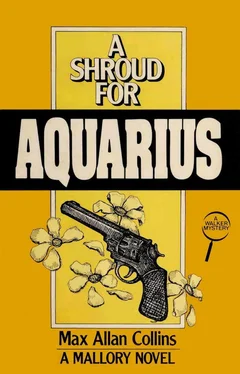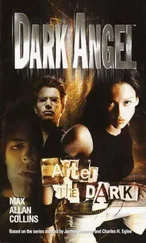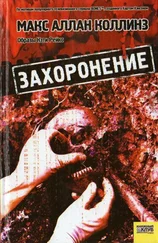I hadn’t found his offices particularly modest — or him, either, for that matter.
I said, “I suppose you’re talking about Life-Investors Mutual.”
One of the hundred top insurance companies in the world.
“That’s right,” he said.
“Ain’t it great,” I said.
He looked at me. “What?”
“Capitalism.”
He gave me a smile that was almost a sneer and said, “I never, ever said I was anything but a capitalist. I also happen to be a socialist, and those terms aren’t contradictory.”
“Whatever you say.”
“You are a shallow son of a bitch, Mallory. I wonder what Ginnie saw in you.”
“You took the words right out of my mouth.”
He opened a drawer and took out a pipe; not the hashish variety, either. He poked some tobacco in and lit up. “Did you ever make it with Ginnie?” he asked.
“No. We were never that way.”
“Just friends.”
“That’s right.”
“Are you gay or something?”
“I’m gay in the sense that I’m a cheerful sort of guy. Other than that, how would you like to ride that pipe?”
He patted the air with his free hand, drawing on the pipe like an older, wiser man than I would ever be. “Take it easy. I just wondered. Ginnie was... well, you know how she was. She seemed to be open, telling you the damnedest things, to shock, to provoke, to entertain you. But she kept certain things to herself. And despite her mentioning you frequently... well, not frequently, but enough that it got on my nerves... I never got a sense of what your relationship might’ve been like.”
“We were friends,” I said. “We grew up together.”
“Brother and sister sort of thing.”
“If you insist. I think of it as friendship and let it go at that.”
“I, uh... guess we’re both a little testy. We’ve both suffered a loss.”
“Yes we have.”
“I loved Ginnie, you know.”
“I did, too, in my way. Do you mind my asking a personal question?”
“Ask, and we’ll see.”
“Why did you and Ginnie break it off?”
He leaned back in his chair, thinking, puffing. The pipe smoke was overly sweet smelling and mingled with the pot smell in a way that turned my stomach.
He said, “I tried to honor her... independence. We had an open sort of relationship. We could see other people, if we liked. And sometimes we did. That... that didn’t bother me. At times I even liked it; my profession is one... conducive to promiscuity.”
An ad man ought to be able to come up with a better way to say “screwing around” than that. But I didn’t point it out.
He went on. “It was certain other habits of hers that I couldn’t put up with.”
“Such as?”
He sighed again. “She’s barely gone. Do we have to talk about that side of her?”
“What side? Was she doing drugs?”
“Drugs wasn’t the problem. Not really.”
“What was?”
He winced. “She was too wild.”
“Wild. Not sexually...”
“No! Well, that, too. But that I could live with. It was a, well...”
“Trade-off. It let you tomcat around if you felt like it.”
He smiled, barely. “‘Tomcat.’ That’s a term I haven’t heard in a while. You really are a small-town boy, aren’t you?”
“I meant to say, it allowed you to lead a life more conducive to promiscuity.”
“Okay. So I called you a hick, and you called me a pompous ass. Can we move on?”
“Sure. Move on to why you and Ginnie really broke up.”
“I couldn’t handle her. Couldn’t handle it.”
“What?”
He put on his glasses; they were tinted, obscuring his eyes. “Well,” he said, sitting back. “You might say I’d about had it with that angst in her pants routine. Long all-night bull sessions about the meaning of life with somebody who hadn’t really grown up yet after thirty-some years on this planet, immature crap, as far as I was concerned, considering what she was doing with her life.”
“What was she doing with her life? What was bothering you about her?”
“Frankly — the gambling. It wasn’t just that she lost money. After all, sometimes she’d win. But it was just too much. She would have a lunch appointment with me, and wouldn’t show up. I’d go home that night and find a note saying, ‘Gone to Vegas.’ Or Tahoe, or even Atlantic City.”
“She’d just go at the drop of a hat.”
He nodded. “Yes. And the drop of thousands of dollars.”
“Was she losing?”
He shrugged. “She had her ups and downs.”
“What about lately?”
“Downs. I’d say, downs.”
I had a hunch; I played it.
I said, “Before you broke up, had she made a Vegas trip recently?”
“Tahoe, actually.”
“Did she use her own money?”
He thought about that before answering. Reluctantly, against his better judgment, he revealed, “She took ten thousand dollars of mine.”
“Where’d she get her hands on that much cash?”
“We had a joint account. It was something she’d been trying to talk me into for a while. As a show of confidence.”
“And you showed her confidence, and she conned you.”
“Essentially, yes.”
“Did she pay you back?”
“No. She said she would, though.”
“What do you know about her selling ETC.’s?”
“Not much. I think she may have played the same sort of game with Caroline as me, though. Caroline Westin is not the sort who’d put up with that kind of thing very long.”
“Why’d Ginnie take your ten grand? She must’ve had money left from the sale of ETC.’s.”
“She got a hundred grand on that deal. But the money hadn’t come through yet, when she took that Tahoe fling.”
“Had it come through before yesterday?”
“I believe so.”
“But she made no move to pay you back?”
“No.”
“Do you think she would’ve?”
“I’m not sure. We broke off pretty bitterly.”
“How did you feel about her, after you broke it off?”
“I hated her. And I loved her. Haven’t you ever known any women, Mallory?”
I stood. “Yeah. A couple. Thanks for the conversation, Flater.”
He stood; he thought about it, then offered his hand. “I suppose there’s no reason for us to be assholes to each other.”
I thought about it, agreed, shook his hand.
He came out from around his desk, slipped on his patched sports coat, checking his watch. “I have an early luncheon appointment. I’ll walk out with you.”
We walked silently out into the reception area, where he said to the receptionist, “I’ll be back by two-thirty, Shirley.”
A burnt-orange nail pointing to the appointment book open on her desk, Shirley said, “Don’t forget your three-thirty appointment in Cedar Rapids, at Investors Mutual.”
“I guess I won’t be back at two-thirty,” he said, to her, smiling a little. “See you tomorrow.”
Shirley smiled at him, then at me, and Flater and I stepped out into the hall, walked to the elevators.
He said, “Do you know when the funeral is?”
“Tomorrow morning. Graveside services at Greenwood Cemetery in Port City.”
“I’ll be there.”
The red elevator doors slid open, and as he got on, I said, “I think I forgot something back there. See you tomorrow.”
He nodded, and the doors slid shut.
I stood looking at the red doors, thinking about the former Yippie propaganda minister who couldn’t abide Ginnie’s me-generation searching, her reckless life style. And, while the irony was hardly lost on me, I couldn’t blame him.
Then I went back and asked Shirley what she was doing after work.
It was turning into one of those summer days that convinced you Iowa City was half trees, half parking lots: almost noon, now — here the sun careened off cement, there it shimmied down through leaves, catching your eyes in a crossfire. I had sunglasses on, but you could’ve fooled me. Sun also bounced off the police station, which was part of the Civic Center (or was that Centre?), a sprawl of tan brick and tinted glass on the edge of the downtown, on the corner of Washington and Van Buren to be exact, where university buildings and small businesses began giving way to residences and frat houses.
Читать дальше












